KIHO's Understanding of Sustainability
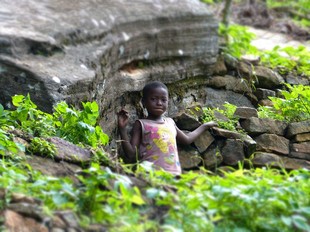
Sustainability Matters for Our Children's Future
Sustainability was defined in the 1980s by the UN in the following way: “Sustainable development is development that meets the needs of the present without compromising the needs of future generations to meet their own needs.” In other words, sustainability is important because all our choices and actions do affect our common future.
KIHO wants to act accordingly and understands sustainability like the ability of an ecosystem to function and maintain productive for a prolonged period. In all our projects and activities, we want to act in a sustainable manner. We need to make wise decisions now in order to avoid limiting the choices of generations to come here in our Kilimanjaro Region and elsewhere around the globe.
KIHO has five principles of sustainability:
- Environmental
- Financial
- Managerial
- Social
- Technical.
* Environmental sustainability

Biodiversity: the richness and variety of nature
The element of
environmental sustainability implies the wider context of nature
and bio-diversity. All of KIHO’s
interventions connect to and affect the natural environment and hence
people’s livelihood. Environmental sustainability is important
because it involves natural resources that human beings need for
economic or manufactured capital. Materials taken from nature are
used for solutions that address human needs. If nature is depleted
faster than it can regenerate, human beings will be left without the
beautiful nature around them. Hence, KIHO wants to address this
problem through tree planting
and other measures that people take
care well of their surrounding environment.
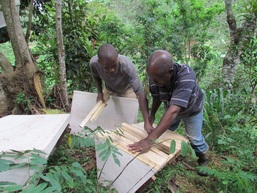
Local materials for beehives building are promoted
* Financial sustainability
Continuity in the delivery of products and services related to the project is assured, because the activities are locally financed like local usage fees for a water project and do not depend on external subsidies anymore. In simple terms, it is about having a set amount of capital for a certain period of time. Those who consume that capital must conserve it so that they will continue to enjoy it towards the end of the specified period and even beyond. This means that we must preserve all our resources as we consume them so that we can enjoy them in the future as well.
Continuity in the delivery of products and services related to the project is assured, because the activities are locally financed like local usage fees for a water project and do not depend on external subsidies anymore. In simple terms, it is about having a set amount of capital for a certain period of time. Those who consume that capital must conserve it so that they will continue to enjoy it towards the end of the specified period and even beyond. This means that we must preserve all our resources as we consume them so that we can enjoy them in the future as well.
* Managerial sustainability
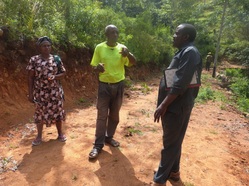
KIHO working on the field with local community
Systems, institutions, policies and procedures at the local level are functional and meet the demand of users or members. All stakeholders are clear on their own roles, tasks and responsibilities, are capable of fulfilling these roles effectively and are transparent to each other.
KIHO makes sure that either community initiative groups are supported or management groups are set up that run the project. After a set of trainings, they are able to run the project responsibly. They are also able to “own” the project and it is not an active that has been imposed from the outside.
KIHO makes sure that either community initiative groups are supported or management groups are set up that run the project. After a set of trainings, they are able to run the project responsibly. They are also able to “own” the project and it is not an active that has been imposed from the outside.
* Social Sustainability
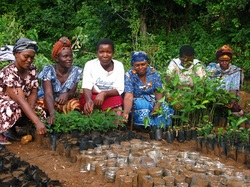
KIHO promotes women initiative groups
Appropriate social conditions can only be reached through social sustainability. KIHO wants to be a catalyst to improve the current and future society so that the communities are able to create healthy and enjoyable lives.
Social sustainable interventions are demand-driven, inclusive gender equal, culturally sensitive and needs-based. Through proper maintenance and adherence to laws, rules and values for the common good, social sustainability can be achieved.
Social sustainable interventions are demand-driven, inclusive gender equal, culturally sensitive and needs-based. Through proper maintenance and adherence to laws, rules and values for the common good, social sustainability can be achieved.
* Technical sustainability
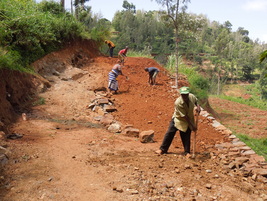
Local people working on the road construction
Technical sustainability is reached when the technology or hardware needed for the services is maintained, repaired and replaced by local people and it is not depleting the (natural) resources on which it depends for its functioning. KIHO makes sure that there is some specialized training for selected people from the community group, preferably with some skills in this area, so that they are able to help themselves.
For sure, sometimes it will be necessary to still rely on outside help, like District engineers. Being able to help each in the community is most effective way because it can be dealt with quickly and without major hurdles.
For sure, sometimes it will be necessary to still rely on outside help, like District engineers. Being able to help each in the community is most effective way because it can be dealt with quickly and without major hurdles.
We need to make sure that we manage all aspects of human life within our communities in a manner that will not destroy the environment as everything on earth is dependent on nature.
